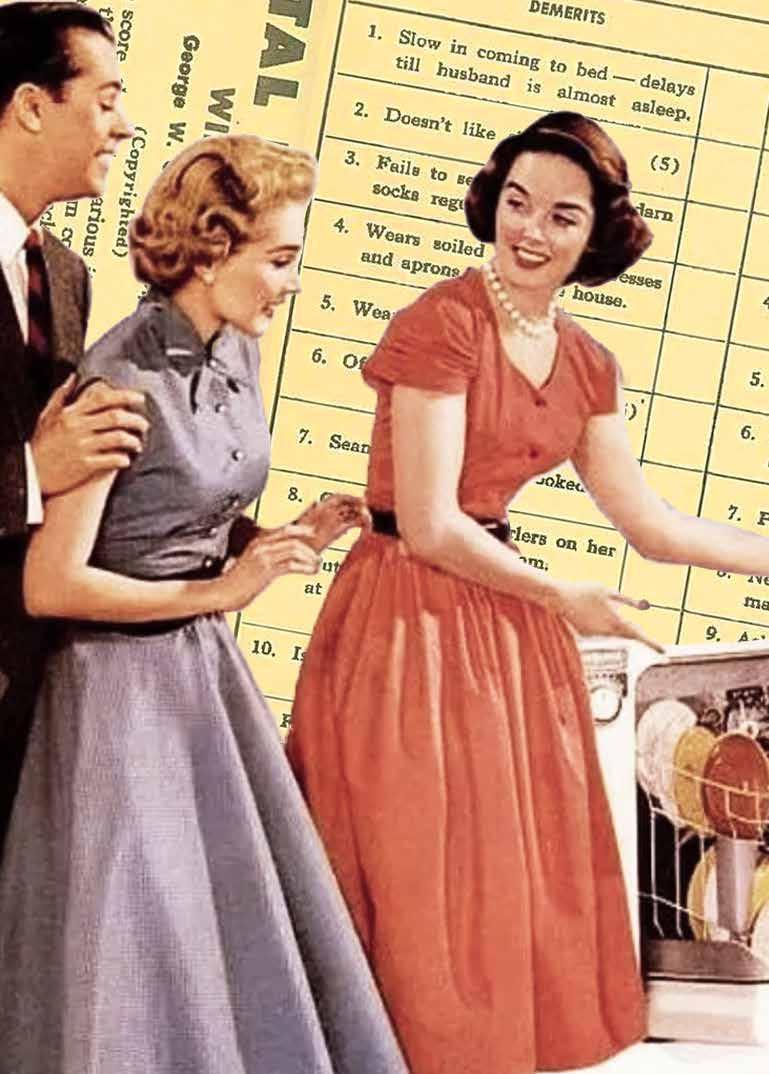
9 minute read
The trouble with Tradwives is
from Hood March Issue
TRADWIVES IS… The problem with
Nothing, says Maxine Eggenberger. The real problem is the promotion of submissiveness. R ecently I was asked what the most scary film I watched was. In 2004, on the cusp of turning 15, I had already made my way through the classics – It, Misery, Psycho – as well as genre-defining films Scream and The Blair Witch Project. None of these, however, formed my response. “Stepford Wives,” I replied in all seriousness. Today, standing before you as a 30-year-old woman, I’m not ashamed to admit the remake of the 1972 satirical thriller petrified me, and continues to do so. If you’re lucky enough not to have wasted two hours of your life watching this film, let me quickly bring you up to speed. Nicole Kidman plays Joanna, a top TV executive who, in the aftermath of a stress-triggered breakdown, moves her family from Manhattan to the upperclass suburb of Stepford in Connecticut. With a veneer that bears a startling resemblance to a dystopian 1950s, Joanna soon discovers that the men are replacing their wives with cupcake-baking, apron-wearing, feather-dusting robots. These wives, as it turns out, were once at the top of their respective fields— neuroscientists, astrophysicists, CEOs. The one thing they all had in common, however? Husbands fed up with living in the shadow of their success. Husbands who would stop at nothing to bend their spouse to their own submissive will.
Advertisement
Now, I love to bake. I have a collection of cute aprons, mostly from Anthropologie. I also get an excessive amount of happiness from dusting. What I can’t get on board with, however, is submissiveness. And that’s the biggest concern I have around the language surrounding the emerging Tradwife collective—a group of female homemakers who focus on the joys of living your life by way of a “traditional” domestic setting. “Traditional” being where the male goes to work and largely controls the finances of the family. At the same time, the female stays at home and tends to her children, while overseeing the household domestics, such as cooking and cleaning.
You’ve likely seen interviews with Tradwives in the Daily Mail, The Times, on the BBC, and This Morning over the last few weeks. However, one Tradwife who seems to be leading the charge is Alena Kate Pettitt. Pettitt runs something called the Darling Academy, a newsletter and YouTube channel that “celebrates British etiquette.” It also encourages you to harness “the best of what made Britain great; that time when you could leave your front door open and know that you were safe, and you knew your strangers in the street.” Without a doubt, Pettitt has become a poster wife for the movement, and, like many successful women, she’s using social media to help her reach a broader audience.
Of course, the entire reason women have fought and continue to fight so arduously is to have the choice to live her life the way she so desires. That’s feminism. So, if you want to be a homemaker, go right ahead. If you’ve set your sights on developing the next tech unicorn, do it. If, like me, you want to devote your life to keeping print journalism alive (even if the rest of the market is in decline), let’s chat.
My writing of this piece coincided with my rereading of Yes Please! by Amy Poehler, in which she devotes an entire chapter to the fact that women are allowed to want different things. “Good for her—not for me,” she surmises. And she’s right. We need to put less energy into not judging others for the choices they make and instead, channel that energy into something more productive. While I’ve come to live by this motto, I struggle to apply it to Pettitt, who, in her own words, said part of her role as a Tradwife is “submitting to and spoiling her husband like it’s 1959.” My problem with that sentence? “Submitting.” And thus, this brings the crescendo of this article.
The term “submit” is now laden with sexual connotations (we have E.L. James to thank for that), but, generally speaking, it means to “yield to a superior force or the authority or will of another person.”
Let’s make one thing crystal clear, to be a homemaker, a stayat-home-mum, whatever you wish to call it; you do not need to be submissive. You just don’t. No person, regardless of their gender, career, age, ethnicity, or social status, should need to sacrifice their own identity to appease that of another.
I have friends who have carved incredibly impressive careers, some of whom are willing breadwinners. Others dream of being a stay-at-home mum but, at present, are unable to do so simply because they don’t have the financial stability. Like any group of women, we each have different wants and desires, but respect and value the choices we each make. However, any pressure to submit, be it at home or in the workplace, is one thing none of us would tolerate, particularly in one another.
Tradwives are in a very privileged position to even have the option of living in a one-income household, but what of others who don’t have this option? Every couple and family should be able to manage their work and relationship exactly how they want, as long as they can live within their financial means. There is no ideal or perfect configuration for a family. To make this happen, we need governments to set policies that allow options. We need to be supported by parental leave and fair taxes, for example, the same tax breaks for “non traditional” couples, be they married or not, heterosexual or not. What this movement has failed to acknowledge, too, is race. The term Tradwife is particularly controversial because of its associations with the far right, especially in the United States. Still, it seems that the Tradwife we’re discussing seems to be seen in predominantly white households, probably because this demographic is the one with the most privilege and choice in general.
Whatever your opinion of Tradwives, raising children, cooking, and cleaning are essential, meaningful jobs that we should treat with respect and consider with equal status to any formal occupation. But submissiveness? That belongs in Stepford. “A woman has the choice to live her life the way she so desires. That’s feminism”









KIRSTY MCWILLIAM

T H E R E A L MEANING OF SUCCESS W ith International Women’s Day upon us, I started thinking about how women’s careers have changed since IWD started way back in 1910 in New York.
Something I have witnessed in my time as a career coach is that more and more women are taking new brave steps out of the norm and creating whole new careers for themselves—no matter their age or life stage. Take The Great British Bake Off’s Prue Leith, who is still starting new businesses in her 80s. Generally, women are not only changing careers but, like Prue, are starting new businesses of their own. Great as this is, a curious being like myself wants to understand why this influx of female business founders is happening. Is the modern workplace not suited to the needs of modern women? Have we been forced to take back control and create a new working pattern that suits us? Or do we feel more empowered to be and do what we want?
The growth of female-founded businesses, however, doesn’t mean we’ve become brazenly confident. Working over the past 20 years, I’ve met some truly amazing women who still hold themselves back. These women often find the fear of

stepping into their success and breaking the norm overwhelming and it’s enough to make them hit pause.
I can relate to this. Fears of what others might think or, even worse, the fear of failing is so large that it’s natural to want to protect yourself. But it could also be that we don’t know what success means to us? Instead of wasting your time and comparing your success to that of others, I say it’s time to do some soul-searching and figure out what success means to you.
We all have different roles we play, and I’ve found it useful to write mine down. 1. Mother 2. Wife 3. Daughter 4. Sister and aunt 5. Friend 6. Leader.
By breaking my many roles down, I can see success means different things under each one. While for my kids, I can’t control their school results or what they enjoy doing, I can do my best to be the kind of mother who listens, who gives advice only when it is asked for, and who lets them be themselves, no matter what. That would be a success—and a stretch! The main thing to remember when writing your roles and your idea of success is to make sure it is within your control. Remember, this is what success means for you and you alone—it doesn’t require comparison or external pressures.
The Leader role was the hardest for me to address—I have so many ideas of what this should be, but how many are unique to me? Identifying what I want to achieve as a leader for my satisfaction is something I intend on spending more time on during 2020.
After a year of writing for Hood, and hopefully bestowing you with newfound wisdom and confidence to carve careers you love, I’m sad to say this is my last such column. I feel the ground we’ve covered has been largely excavated and now I’m excited to see what you do with everything we’ve highlighted here.
I cannot thank you enough for the brilliant feedback so many of you have given me about my musings; writing this column has opened so many doors for me – some I could never have even dreamed of – and, as such, it’s put me on a new path. Initially, I was daunted; I had an innate fear of putting myself out there, but this experience has been the greatest learning curve. I’ve come to know that not everyone will agree with you, and that’s okay. I’ve also realised I’m perhaps braver than I initially thought. The connections I’ve made, however, are the greatest achievement of the last 12 months. I’d like to extend a thank you to all at Hood HQ for allowing me to be a part of your girl gang; it has been a blast. Rather fittingly, my final wish for us all this International Women’s Day, and the others that follow it, is that we all understand and celebrate our successes.
This isn’t goodbye by any means; you’ ll likely still see me crop up now and then. Until then, thank you, dear readers—it’s been a privilege. Over and out.










